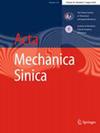Dynamic equivalence conditions for an air-bearing simulator emulating scaled drag-free control dynamics
Abstract
The ground-based experimental tests are crucial to verify the related technologies of the drag-free satellite. This work presents a design method of the ground simulator testbed for emulating the planar dynamics of the space drag-free systems. In this paper, the planar dynamic characteristics of the drag-free satellite with double test masses are analyzed and non-dimensionalized. A simulator vehicle composed of an air bearing testbed and two inverted pendulums is devised on the basic of equivalent mass and equivalent stiffness proposed firstly in this paper. And the dynamic model of the simulator equivalent to the sensitive axis motion of the test mass and the planar motion of the satellite is derived from the Euler-Lagrange method. Then, the dynamic equivalence conditions between the space prototype system and the ground model system are derived from Pi theorem. To satisfy these conditions, the scaling laws of two systems and requirements for the inverted pendulum are put forward. Besides, the corresponding control scaling laws and a closed-loop control strategy are deduced and applied to establishing the numerical simulation experiments of underactuated system. Subsequently, the comparative simulation results demonstrate the similarity of dynamical behavior between the scaled-down ground model and the space prototype. As a result, the rationality and effectiveness of the design method are proved, facilitating the ground simulation of future gravitational wave detection satellites.

 求助内容:
求助内容: 应助结果提醒方式:
应助结果提醒方式:


